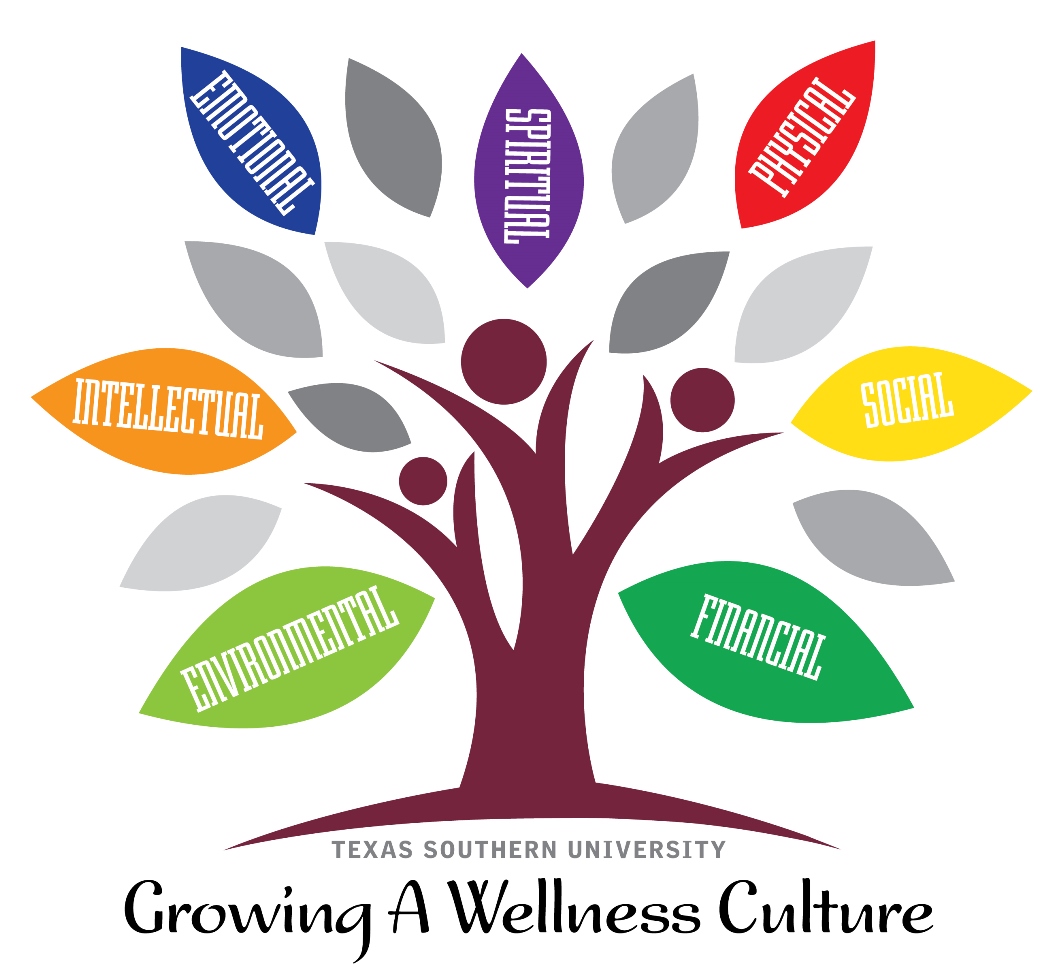7 Wellness Areas

Growing A Wellness Culture
Emotional Wellness involves being aware of your thoughts and feelings and making the choice to have a positive attitude and embrace life.
Tips on being Happier:
- Practice stress management techniques.
- Acknowledge and recognize your feelings.
- Learn emotional intelligence techniques so you can have better control of your emotions.
- Smile at least 20 times a day.
- Commit acts of kindness.
- Count your blessings.
- Avoid over- thinking and social comparisons.
- Forgive.
- Create and focus on your goals.
- Nurture your relationships.
- Seek professional assistance when you need help.
Resources Available
The Employee Assistance Program (713-500-3327) UTEAP.org
The University Counseling Center (713-313-7804)
Campus Police (713-313-7000)
National Suicide Prevention 24hr Lifeline (1-800-273-8255)
Houston Area Nurseline (713-338-7979)
Spiritual Wellness involves getting in touch with your core self, having a sense of meaning, purpose,
and appreciation in your life.
Healthy Practices:
- Practice gratitude.
- Take time to be silent.
- Look for a deeper meaning.
- Remember your core values.
- Be accepting of others.
- Be a doer. Don’t just speak it or read it. Live a life that honors your beliefs and values.
Physical wellness involves taking care of your body. This is achieved by maintaining a regular fitness routine and eating a healthy balanced diet. Physical wellness also includes cardiovascular health and endurance, flexibility, and muscular strength.
Healthy Habits:
- Take responsibility for your healthcare.
- Maintain a healthy weight.
- Get enough sleep.
- Avoid using tobacco and recreational drugs.
- Get physical activity on a regular and consistent basis.
- Get regular checkups and screenings.
- Seek medical attention when ill.
The University Recreation and Wellness Center is your one-stop shop for information and resources on becoming and staying physically well. Whether you want to work with a personal trainer, run a few laps around the indoor track, swim in the pool, take a class, or if you need a health assessment and tips on eating well, the Rec Center is there for you.
Financial wellness is a state of financial well-being. It includes having an understanding of your financial situation and taking care of it in such a way that you are prepared for financial changes.
Maintaining that balance consists of having:
- Minimal financial stress.
- A strong financial foundation consisting of little or no debt, an adequate emergency savings fund and living below your means.
- An ongoing plan that puts you on track to reach future financial goals.
Social Wellness involves having good positive relationships with those around you and establishing a strong support system.
How to achieve Social Wellness
- Healthy relationships
- Community involvement
- Accepting diversity
Healthy Tips!
- Set realistic expectations in your relationships.
- Communicate.
- Be flexible.
- Be reliable.
- Enjoy your own company.
- Show warmth and affection.
- Be willing to help others.
- Accept those around you.
- Foster positive work relationships with your coworkers.
Environmental wellness involves being aware of, and taking responsibility for the air, water, and environment
around us.
Reduce, Reuse, Recycle
Environmental Tips:
At Home:
- Use energy efficient appliances.
- Consider washing your clothes in cold water.
- Consider paperless billing.
- Recycle your old magazines.
- Turn off the lights and unplug electronics when they’re not in use.
At the Office
- Print on both sides of the paper.
- Use reusable coffee mugs and water bottles.
In the Community
- Carpool.
- Take your own bags to the supermarket.
- Take fewer napkins when you eat out.
Intellectual Wellness involves engaging in mentally stimulating activities that feed your creativity and inspires you.
How to improve:
- Become a mentor.
- Discover new hobbies.
- Take a course / learn a new language.
- Sign up for newsletters or blogs that cover interesting topics.
- Watch educational programs and documentaries.
- Read the newspaper and your trade publications.
- Play games like crossword puzzles, Chess, Scrabble and Sudoku.
- Discuss your career progression with your manager/ supervisor.
- Seek ways to improve your work performance.
- Join professional organizations.
- Take advantage of learning opportunities offered at work.
No results found. Try another search?